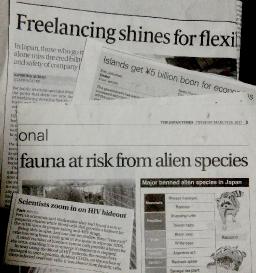
Stats
Work interests: research, editing, science communication
Affiliation/website: National Museum of Ethnology, Osaka
Preferred contact method: Any
Preferred contact language(s): English, German
Contact: email = researchcooperative-at-gmail-dot-com
Favourite publications: Various, and especially the open access versions of older journals with effective review systems
Founding Member
Affiliations: 1996-present: National Museum of Ethnology, Osaka. 1995: Freelance editor, Kyoto. 1994: JSPS Research Visitor, Kyoto University, Kyoto. 1993: Research Visitor, Australian National University, Canberra. 1991: Visiting Researcher, National Museum of Ethnology, Osaka.1990: STA Fellow, National Institute for Ornamental Plants, Vegetables, and Tea (NIVOT), Ano, Japan
Contact: National Museum of Ethnology, Senri Expo Park, Suita City, Osaka, Japan 565-8511
Biographical: Established the Research Cooperative in 2001
Favourite Publications: Various
Confessions of a newsclipping addict

My Japanese wife reads two newspapers per day but claims it is just one, with morning and evening editions. She's a subscriber and reader. She has a photographic memory. I'm a non-subscriber and a clipper.
To be precise, I am a newsclipping addict. For environmental reasons!
Clipping helps me to remember things. I forget what exactly, but surely it does. Or at least, I know that I have already seen a paper if I find holes in it.
I've made a pact that I should not buy my next paper until I've finished clipping what catches my eye from the previous paper next to my chair at our dining table. I'm systematic, each page checked for clipworthy news is folded and put onto the paper recycling pile. A huge pile of paper in the corner of our living room.
We all read newspapers at the table, most often during breakfast. This includes my son. It is rude and unsociable but when else are we going to get time to read the paper? My son has all day (he lives at home, the newspaper is his university, along with the internet). My wife and I have only minutes free, squeezed into busy work schedules.
Clipworthy means I want to read the article twice. Or see it again in twenty years. Maybe use it for teaching. Maybe write about it. Maybe dream about it. Maybe see a new direction for my research, or change my life because of it.
I always think that another PhD lives in the questions raised by a good piece of news writing. I have hundreds of possible PhD topics stashed away in my paper files, waiting for the students I will never have. Waiting for second lives and further reincarnations for which I have every hope but no reasonable expectation. One life seems lucky enough, a sparkling moment at the surface of a broad and continuous stream.
Perhaps that is the miracle of news. We can live many lives through the stories we read. Good news means news that has meaning, significance, resonance. It sparkles, or makes me miserable, drowns my spirit -- but I cannot turn down the chance to learn from something that catches my eye or mind or heart. Or stomach. From past experience, I trust my gut reactions. Sometimes I clip first, and then later understand why I did that.
Really bad news is a nightmare that I try to forget. I don't need to know everything about problems that I cannot do anything about. There are enough unhappy and happy stories that I should look at. They concern matters close to my own life and work. Agriculture, food security, pest and disease in the food chain, arable land loss, global fertiliser supplies, poverty, over-population, food trade, small-scale farming, artists, writers, farmers, plants, or animals.
I may be a wide-grazing, newsclipping addict, but that doesn't mean I don't have focus.
The news is a lens. The optics may be fuzzy at times, but newspapers do give me a deeper, wider perspective on what I am doing with the rest of my day. I like taking what comes, sorting out the wheat from the chaff, finding unexpected gems. What will the next turn of the page bring?
The news is a drug. Clipping the news is a daily addiction, accompanied by sounds of family, rain, frogs chirping in the fields outside, passing trains, another cup of tea. Followed by a dash to the station, with ideas to think about as I study the space between my nose and the next passenger.











